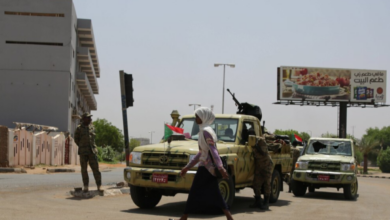If you live in Latin America, how does the war in Syria affect you?
Although the region has little to contribute to the conflict, two countries could be in the eye of the hurricane

What began in March 2011 as a peaceful uprising against the regime of Bashar al-Asad, is today a bloody war that in seven years has left more than 470,000 dead and caused the departure of the region of 5.6 million citizens , as indicated in the latest reports of the Syrian Center for Policy Research and the United Nations High Commissioner for Refugees (UNHCR).
Leer en español: Si vive en Latinoamérica, ¿cómo le afecta la guerra en Siria?
Those who have not fled or died in the middle of the war, face their own battles every day to find food, water, medicines or just stay alive. More than 6.1 million internally displaced persons gave up everything in search of an 'attempt' of protection. And women and girls are sexually exploited by members of the teams responsible for providing humanitarian aid in the area, in exchange for a little food.
War analysts and policy experts agree that it has been the international intervention responsible for the war in Syria has been extended for years. Their military, financial and political support, both for the Syrian government and for the rebel opposition groups, have prevented the defeat of any of the participants in the conflict and have transformed themselves IGNORE INTO an exchange of interests of powers that seem to have forgotten the lives of civilians innocents who fall in the middle of the conflict.
A war of interests?
The actors of the conflict in the war in Syria have branched out IGNORE INTO global dimensions. On the one hand, the battle between the government and the rebels is evident, and on the other, there is an attempt to control the escalation of terrorist organizations such as ISIS. Russia and the US, each with their respective allies, fight to demonstrate their power and Latin America observes distant a scenario that could be replicated in Venezuela.
Russia as al-Assad's main ally, watches over the particular benefit it gains from Syria, which allows the Kremlin to sustain an uninterrupted flow of oil and weapons through a protected Syrian port. Meanwhile, the US supports the rebels with the supposed objective of freeing the people from the chains of the regime and fighting against terrorism and attacks on civilians.
For its part, Latin America condemns the chemical attacks against the population and rejects, although not in a resounding manner, the violent escalation undertaken by the US, France and the United Kingdom on Syria. Although the Latin American region has no direct interests in the Syrian war, its observer role leads some countries to show what could happen on their land if the US He decided to use his force against the regime.
This would be the case of the governments of Nicolás Maduro in Venezuela and Daniel Ortega in Nicaragua, nations that would be in favor of Russia because of the commercial alliances they have with the Kremlin.
Venezuela: Latin American Syria?
After the US response and its allies against chemical attacks in Syria, international organizations and numerous countries, approved the act considering it "morally correct". This fact aroused the concern of different entities in Latin America that questioned the reason why the United States it has avoided a military penetration in Venezuela.
For many analysts, the reason why the US has not deployed a humanitarian intervention in the Latin American oil country, responds that it is not part of one of the priorities of the administration of Donald Trump and its low interest to arouse a conflict with the nations that oppose that act. In addition to this, the costs of a military outpost do not seem to be remunerated.
A region with little to offer refugees
Due to the socio-economic difficulties of most Latin American countries, the region does not represent a viable option for the thousands of refugees fleeing the war in Sria every day.
Only Brazil, Argentina, Chile and Uruguay have structured government plans to receive Syrian refugees. According to data provided by the National Committee for Refugees of Brazil (CONARE), in May 2016 the Syrians formed the largest refugee community, with 2,298 of the 9,000 legally living in this country, thus becoming the South American nation to host half of the refugees that arrive in the region.
According to UNHCR statistics, nearly 5,000 Syrian refugees have arrived in Latin America in recent years. Although the figure is on the rise, it is still significantly lower than that registered in Europe. This is not only due to the distance between the regions, but also due to the high unemployment rates and few economic aid that the Syrians find in the Latin American nations.
Latin American Post | Krishna Jaramillo
Translated from "Si vive en Latinoamérica, ¿cómo le afecta la guerra en Siria?"





